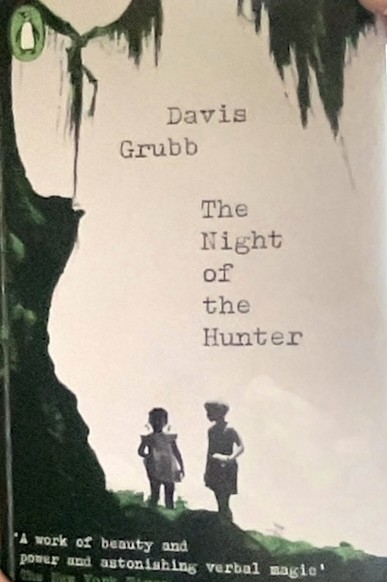Inspiring Older Readers
 posted on 05 Nov 2023
posted on 05 Nov 2023
The Night of the Hunter by Davis Grubb
Neglected popular classics don’t always live up to the reputation that sometimes precedes them. Davis Grubb’s early-50s noir thriller, The Night of the Hunter, just reissued in Penguin’s new crime and espionage series (another title is reviewed here), was a bestseller when first published, was shortlisted for the National Book Award, and in 1955 was memorably filmed starring Robert Mitchum as the terrifying itinerant preacher and misogynistic killer, Harry ‘Preacher’ Powell. It has been called ‘the gold standard of southern noir’ by one writer, and ‘a work of beauty and power and astonishing verbal magic’ by the New York Times. I thought it was time I gave it a try.
Set in rural Virginia on the Ohio river, the action takes place sometime during the terrible Depression years of the 1930s. Ben and Willa Harper, a married couple in their early-forties have like so many fallen on hard times. Scarcely able to feed their two young children, John, nine, and Pearl, four, their father has become obsessed by money and the social and economic injustices that are condemning him and millions like him to a brutal struggle for survival. In desperation he robs the local bank, in the process murdering two cashiers. When the book opens he is in prison awaiting execution. His cellmate is Harry ‘Preacher’ Powell, an itinerant preacher, who spends every waking hour trying to get Ben to reveal where he has hidden the ten thousand dollars he took from the bank; every search the police have made has failed to recover it. As soon as the Preacher is released he sets out to find the money.
The point of view throughout is most often that of the child John, his mother Willa, or one of the farmers or store owners who are their neighbours. This requires relatively simple and direct writing and a strong command of vernacular speech. But occasionally we hear Grubb’s own authorial voice and it offers a powerful contrast and deepens the novel – as here, where he describes the social and psychological impact of the awful Depression years:
"It was no strange sight in the land in that lean and fallow time: children running the woodlands and the fields without parents, without food, without love. Families were shattered and broken asunder in that black decade and the children were driven to fend for themselves like the whelps of random litters: in the lanes of the back counties, roaming the big highways, sleeping in barn lofts or in old abandoned car bodies on town junk heaps; stealing food where they could or accepting it from the hands of some kind farm woman who could see within their ravaged faces a vision of herself or of her own kind or of some dark portent of what might yet come to pass upon herself or to her own."
It is at these moments especially, I think, when the underlying sophistication of the novel becomes apparent and one hears the cadences of other great Southern writers such as Flannery O’Connor, Carson McCullers, perhaps even William Faulkner. It makes for writing that is both profoundly atmospheric and intellectually satisfying.
The two young children hold the key to their father’s hidden stash of money and the Preacher is relentless in his search. The second half of the book becomes increasingly tense, building towards an awful denouement with the certainty of a Greek tragedy, even the voices of the local farmers and working people increasingly seem to resemble those of a lamenting Greek chorus.
Steeped in notions of sin, punishment and redemption, The Night of the Hunter offers a bleak vision of the world, but ultimately not an entirely pessimistic one: despite grinding poverty and almost medieval superstition, there is also kindness, courage and humanity. This is that rare thing – an exciting thriller that transcends its genre and is also a genuine literary achievement. Not to be missed.
Alun Severn
November 2023